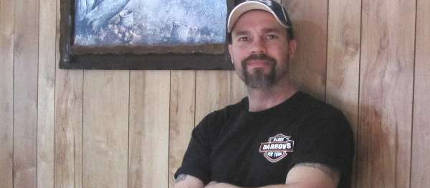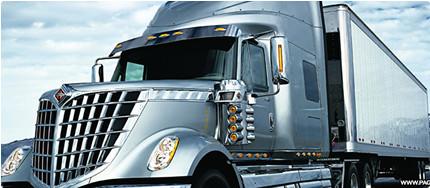Review Questions - Click On The Picture To Begin...

- Right Turn Signal
- Fog lamps
- 4-way emergency flashers
- High beam headlights
Quote From The CDL Manual:
Lighting indicators: Test that dash indicators work when corresponding lights are turned on:
- Right turn signal
- 4-way emergency flashers
- High-beam headlights
TruckingTruth's Advice:
Be sure to demonstrate each lighting indicator on the dash and tell the examiner what you're doing. For example, while demonstrating, you should say:
"I am now checking the lighting indicators to be certain the dashboard lights function properly. The turn signal indicators work (while checking the turn signals), the 4-way emergency flashers indicator works (while checking the 4-way emergency flashers), and the high beam headlight indicator works properly."
- Clean and properly adjusted
- No obstructions
- No damage
- You should look for all of these things
Quote From The CDL Manual:
Mirrors and windshield:
- Mirrors should be clean and adjusted properly from the inside.
- Windshield should be clean with no illegal stickers, no obstructions or damage to the glass.
TruckingTruth's Advice:
What to tell the examiner:
There are no cracks, breaks, or obstructions in the windshield or mirrors and the the mirror and windshield are clean and properly adjusted.
- Yes, but only the air horn has to function properly
- Yes, but only the electric horn has to function properly
- No, the horns do not need to be checked during a pre-trip inspection
- Yes, both the electric horn and the air horn must be shown to work properly
Quote From The CDL Manual:
Horn:
Check that air horn and/or electric horn work.
TruckingTruth's Advice:
While laws vary from state to state, when taking your pre-trip exam, you should demonstrate that both the city (electric) horn and the air horn function properly. As you're demonstrating, here's what to say:
"I am now checking the city horn and the air horn to be sure they are both properly functioning."
This is one thing that many people forget to do when taking the pre-trip exam. Don't forget the horns!
- Spare light bulbs
- Spare electrical fuses (unless equipped with circuit breakers)
- Properly charged and rated fire extinguisher
- Three red reflective triangles
Quote From The CDL Manual:
Emergency equipment:
- Check for spare electrical fuses.
- Check for three red reflective triangles.
- Check for a properly charged and rated fire extinguisher.
TruckingTruth's Advice:
You must memorize the required safety equipment and show the examiner where all of these items are located.
- Road flares, reflective safety vest, fire extinguisher
- Spare electrical fuses, three red reflective triangles, fire extinguisher
- CB radio, spare light bulbs, first aid kit
- First aid kit, road flares, fire extinguisher
Quote From The CDL Manual:
Emergency equipment:
- Check for spare electrical fuses.
- Check for three red reflective triangles.
- Check for a properly charged and rated fire extinguisher.
TruckingTruth's Advice:
Be sure to memorize all of the required safety equipment and know where the equipment is located so you can show the examiner.
- Only the heat and defroster
- Only the heat
- Only the air conditioner
- All of these must work properly
Quote From The CDL Manual:
Heater/defroster:
Test that the heater and defroster work.
TruckingTruth's Advice:
All commercial vehicles are required to have properly working heat and defrosters. You must demonstrate that both the heat and defrost work separately and function properly. When checking the defroster, move your hand near the windshield so you can feel the air and be sure the examiner sees you checking to be sure it functions correctly. You should then change the airflow so that it comes out of the vents only and feel to make sure the air is warm. Here's what to say to the examiner while checking the heat and defrost:
"I am now checking to be sure the heater and defroster work properly and they must work separately from each other."
- Play should not exceed 15 degrees
- Play should not exceed 5 degrees
- Play should not exceed 20 degrees
- Play should not exceed 10 degrees
Quote From The CDL Manual:
Steering play:
- Non-Power steering - Check for excessive play by turning steering wheel back and forth. Play should not exceed 10 degrees (or about 2 inches on a 20-inch wheel).
- Power steering - With the engine running, check for excessive play by turning the steering wheel back and forth. Play should not exceed 10 degrees (or about 2 inches on a 20-inch wheel) before front left wheel barely moves.
TruckingTruth's Advice:
What to tell the examiner:
"The steering wheel has less than 10 degrees of free play, is not bent, broken, or cracked and is properly mounted and secured."
- After starting the engine, check that the pressure gauge shows declining oil pressure
- None of these answers are correct
- The pressure gauge should show normal pressure immediately after engine start
- After starting the engine, check that the pressure gauge shows increasing oil pressure
Quote From The CDL Manual:
Oil pressure gauge:
- Make sure oil pressure gauge is working.
- Check that pressure gauge shows increasing or normal oil pressure or that the warning light goes off.
- If equipped, oil temperature gauge should begin a gradual rise to the normal operating range.
TruckingTruth's Advice:
What to tell the examiner:
I'm checking the oil pressure gauge to make sure pressure is building to normal operating range.
- Depress the clutch, place gearshift lever in the neutral position, start the engine and release the clutch slowly
- Start the engine, depress the clutch, place gearshift lever into the neutral position, release clutch slowly
- Depress the clutch, start the engine, move the gearshift lever into the neutral position, release the clutch slowly
- Place gearshift lever in the neutral position, start the engine, then depress the clutch
Quote From The CDL Manual:
Clutch/gearshift:
- Depress clutch.
- Place gearshift lever in neutral (or park, for automatic transmissions).
- Start engine, then release clutch slowly.
- Washer fluid operates correctly
- All of these should be checked when inspecting windshield wipers
- Properly secured
- Operate smoothly
Quote From The CDL Manual:
Wipers/washers:
- Check that wiper arms and blades are secure, not damaged, and operate smoothly.
- If equipped, windshield washers must operate correctly.
TruckingTruth's Advice:
When checking windshield wipers, tell the examiner:
"Arms and blades are secure and operate smoothly. Wiper blades are not cracked or dry rotted and the washer fluid operates correctly."
Be sure to demonstrate the wiper and washer functions.







 TT On Facebook
TT On Facebook